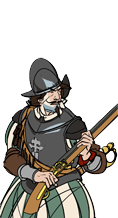
Basic Unit Statistics (can be modified by difficulty level, arts, skills, traits and retainers)
| Recruitment Cost | 850 | |
| Upkeep Cost | 150 | |
| Melee Attack | 12 | 34% |
| Charge Bonus | 15 | 30% |
| Bonus vs Cavalry | 0 | 0% |
| Range | 100 | 15% |
| Accuracy | 65 | 65% |
| Reloading Skill | 35 | 35% |
| Ammunition | 15 | 18% |
| Melee Defence | 2 | 5% |
| Armour | 8 | 53% |
| Morale | 10 | 20% |
Strengths & Weaknesses
- Good range but shorter than bow units.
- Devastating damage.
- Good accuracy, reload rate and morale.
- Good in melee.
- Vulnerable to cavalry.
Abilities
- Fire by Rank - Will fire by rank from front to rear, each rank kneeling to reload and allowing those behind a clear field of fire.
- Rapid Volley - Temporarily increases a unit's rate of fire.
Requires
Description
Armed with matchlocks and swords and armoured in European style, these Portuguese soldiers are dangerous foes.
These troops are easily recognisable on any Japanese battlefield thanks to their European armour. They wear iron breastplates and morions: helmets often seen as being of a "Spanish" style. They are well trained with their matchlock muskets and can lay a withering fire upon their enemies. In melee, they can give a reasonable account of themselves if attacked. It is, however, a foolish and wasteful commander who throws them into close combat as assault troops against samurai. The Portuguese "terco" was a direct copy of the Spanish "tercio", a powerful battle formation divided into "thirds" armed with, respectively, matchlocks, pikes and swords. Within each tercio, these troops acted to support each other and shield weaknesses, making them battle-winning units in Spain's many wars. Spanish tercios dominated European battlefields for many years in the 16th Century. Other powers, as is always the case with military fashions, rushed to copy the style of winners. The Portuguese were no different, and their tercos included the romantically named "Terco of Adventurers" recruited from among the sons of the nobility and gentry. It is not unreasonable to assume that these well-regarded soldiers, and particularly matchlock gunners, would have been sent out, if requested, to aid Portuguese allies.